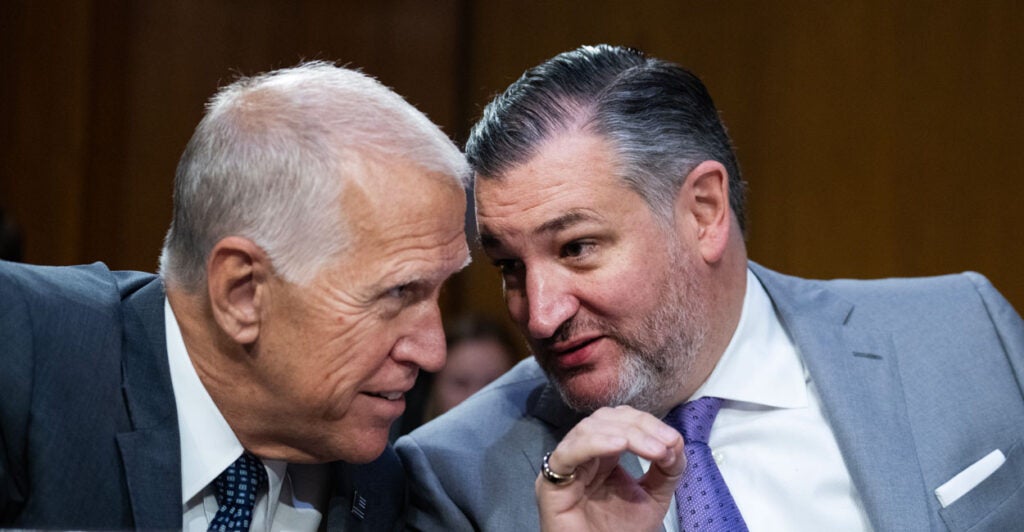After weeks of negotiations, the Senate has passed the One Big Beautiful Bill Act—a ten-year fiscal package which would serve as the vehicle for fulfilling President Donald Trump’s campaign promises on tax cuts and border security.
Despite intra-party debates on overall deficit levels, healthcare reform and how to undo President Joe Biden’s environmental policies, Republicans were ultimately able to find a consensus under the leadership of newly-minted Senate Majority Leader John Thune, R-S.D.
The bill, which has passed by a margin of 51-50 in the Senate with Vice President JD Vance casting the tie-breaking vote, will now go to the House of Representatives, which passed an initial version by a one-vote margin in May.
From the beginning, Senate Republicans had a herculean task after receiving the 1,000-page mega-bill that was narrowly passed by the House.
Trump largely stayed out of specific debates within the party but urged the bill’s passage in order to provide funding for key priorities, such as border security and defense, as well to prevent an automatic tax increase at the end of the year when his 2017 tax cuts expire.
Republicans remained broadly united on those main priorities but disagreed on how exactly to shape the colossal legislation.
Of course, Republicans never expected any help from Democrats. Senate Minority Leader Chuck Schumer, D-N.Y., opposed the package at every turn, calling it a “Big Ugly Betrayal” and characterizing it as an attack on the poor to give the wealthy tax cuts.
Despite being locked out of the process, Schumer stood by his members as they appealed provisions before Senate Parliamentarian Elizabeth MacDonough (essentially the chamber’s rules referee), who in turn advised that many provisions would be subject to a 60-vote threshold.
MacDonough did so under the Byrd Rule, a Senate rule meant to block provisions in 10-year budget packages that are more policy-oriented than budgetary. The reforms she rejected included preventing illegal immigrants from accessing Medicaid benefits and stopping taxpayer funds from going to transgender surgeries.
Republicans had to amend and resubmit several provisions to MacDonough in order to regain lost ground on benefits reforms and other cost-saving items.
The House bill contained controversial provisions such as quadrupling to $40,000 the cap on state and local tax (SALT) deductions—a federal tax break popular among blue state Republicans, but universally unpopular among Senate Republicans. Senate Republicans tweaked that provision by keeping its fundamental features, but making the cap revert to $10,000 after 2029.
Additionally, the Senate GOP had four budget hawks who urged more fiscal restraint in the bill: Sens. Ron Johnson of Wisconsin, Mike Lee of Utah, Rick Scott of Florida, and Rand Paul of Kentucky.
The first three urged more aggressive spending cuts, while Paul focused on asking that the Senate remove the provision to raise the debt limit, arguing for a separate bill to address the matter.

Health care proved to be a tremendously touchy issue in the Senate as well.
A number of Republican senators—particularly Josh Hawley of Missouri, Susan Collins of Maine, Thom Tillis of North Carolina, Jerry Moran of Kansas, Lisa Murkowski of Alaska, and Jim Justice of West Virginia—urged restraint on certain Medicaid reforms, such as lowering the provider tax, a tool states use to obtain extra federal health care funding.
Leadership attempted to thread the needle and appeal to both fiscal hawks and Medicaid defenders, creating a relief fund for rural hospitals to ease fears over the restructuring of the health care system.
Early on, the Senate also decided to make more tax cuts permanent in the bill, largely at the urging of tax cut advocates, such as Sen. Steve Daines, R-Mont.
Trump mostly stayed out of small policy debates but urged the bill’s passage on the social media platform Truth Social, saying, “I HATE ‘GREEN TAX CREDITS’ IN THE GREAT, BIG, BEAUTIFUL BILL. They are largely a giant SCAM.”
That was in response to proposals from Tillis and other senators to delay the expiration of Biden-era green energy incentives. The Senate appears to have listened, as the final version of the bill includes an end to new tax credits for green energy projects placed in service after 2027.

All the while, the House watched the debates in the Senate carefully.
Rep. Chip Roy, R-Texas, a fiscal hawk in the House Freedom Caucus, claimed that the Senate was focused on “just the tax-cuts side.”
“They’re backing away from the spending cuts, the spending restraint. They’re backing away from the reforms that we think makes the math work,” he said in a House floor speech Friday.
SALT tax break advocates also closely monitored the process, making frequent threats to kill the bill in the House if the Senate abandoned deals made in the original bill.
On Friday, Trump expressed confidence that Republicans would pass the bill.
“Every Republican senator is committed,” Trump said. “You could have a couple of grandstanders, in all fairness.”
The bill passed its first test Saturday night, when Senate leadership, as well as Vice President JD Vance, were able to persuade late holdouts Scott, Murkowski, Johnson, and Lee, as well as Sen. Cynthia Lummis, R-Wyo., to vote on a motion to proceed.
Paul and Tillis, however, voted against allowing the bill to come to the floor.
Trump responded by threatening to support a primary challenger against Tillis. The next day, Tillis announced that he would not seek reelection in 2026.
Tuesday’s vote came after an excruciatingly long period of floor deliberation, as Schumer used an obscure Senate rule to require the reading of the entire bill on the floor before debate began.
After the reading of the bill, the Senate considered dozens of amendments.
Notably, Sen. Marsha Blackburn, R-Tenn., introduced an amendment which struck a provision that would discourage state regulation of artificial intelligence.
This provision, which was controversial in both the House and Senate, was struck by a 99-1 vote, with only Tillis voting in favor of keeping it.
The “vote-a-rama,” as this budget debate is colloquially known, stretched on from Monday morning into Tuesday afternoon as Senate leadership huddled with potential holdouts—possibly due to last-minute hesitation on whether Republicans had the votes to pass the bill.












